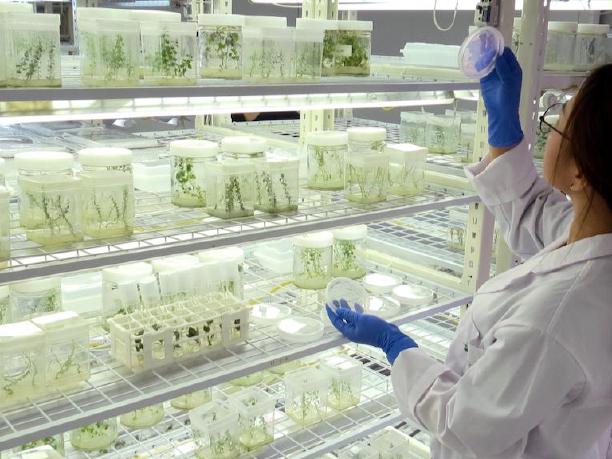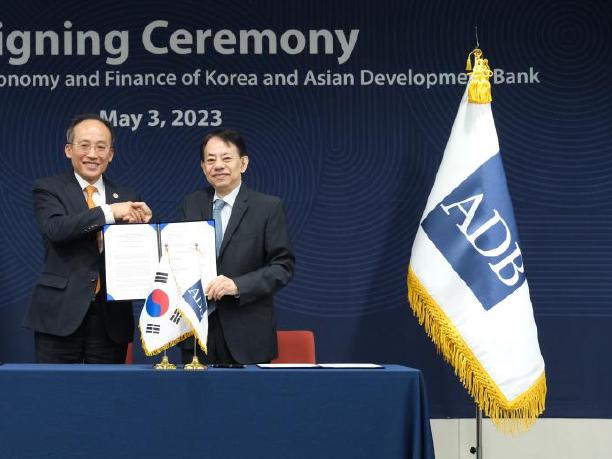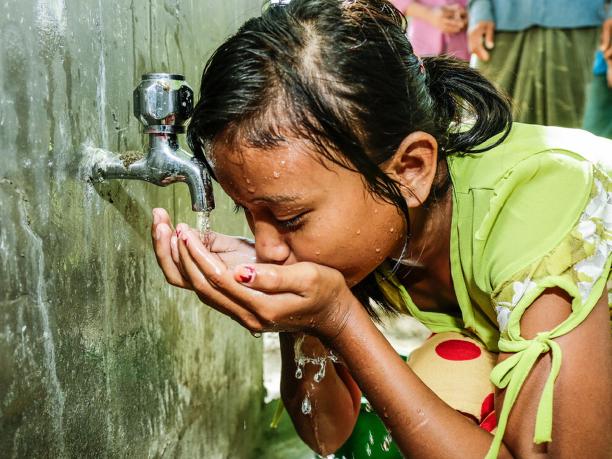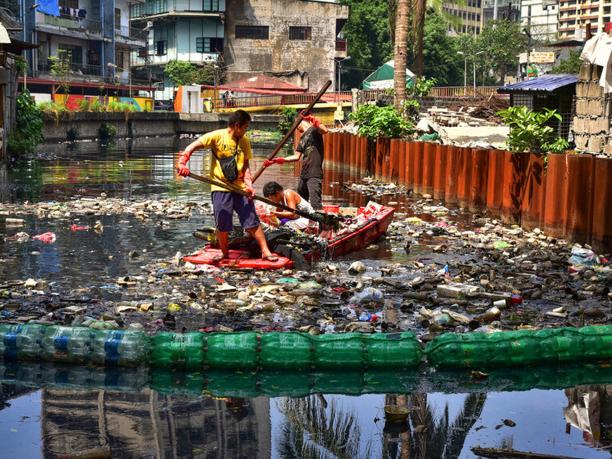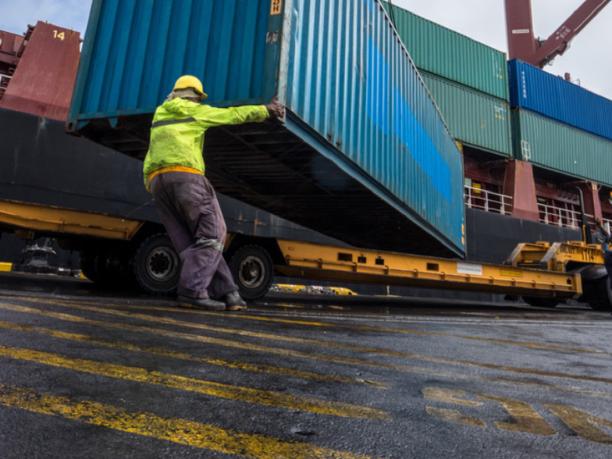Republic of Korea
Listen to the article
Cumulative
- Project-Specific Cofinancing $2.3 billion
- Contributions Committed to Trust Funds $298.3 million
2023
- Project-Specific Cofinancing $190.1 million
- Trust Funds Contribution $100 million
Partnership Framework Arrangement
Signing Date 4 May 2021
Completion Date 4 May 2024
The Republic of Korea (ROK) channels its work in international cooperation and development assistance through several offices. Collaboration between ADB and the government is maintained with the Ministry of Economy and Finance (MOEF) and the Export–Import Bank of Korea, also known as Export–Import Bank of Korea or KEXIM.1 The government provides the official development assistance loan program that promotes its economic cooperation among developing countries through the Economic Development Cooperation Fund funded by MOEF and administered by KEXIM. The Korea International Cooperation Agency2 under the Ministry of Foreign Affairs is responsible for grant aid and technical cooperation to developing countries. Other ministries and agencies collaborating with ADB include the Ministry of Agriculture, Food and Rural Affairs; the Korea Meteorological Administration;3 the Korea Energy Agency;4 and the Public Procurement Service.
The ROK has had a standing memorandum of understanding (MOU) with ADB since 2008 to enhance collaboration in sovereign cofinancing. The latest MOU commits to providing $700 million of concessional loans for cofinancing from 2021 to 2024, $350 million of which is earmarked for the ASEAN Catalytic Green Finance Facility. KEXIM has another MOU with ADB, signed in 2017, to help improve and support the development and financing of infrastructure projects in the region through public–private partnerships.
ADB also works with the Ministry of Agriculture, Food and Rural Affairs (MAFRA). ADB signed a partnership framework arrangement (PFA) with MAFRA in 2018 for technical assistance cofinancing and expert arrangement for W2 billion ($1.7 million). The PFA aims to promote technological advances in farming techniques, mainstream high-level technology in upstream and downstream agricultural activities, and support inclusive agribusiness. In 2021 and 2022, it was amended to extend the partnership and reallocate funds to engage a new expert to support ADB’s Rural Development and Food Security (Agriculture) Thematic Group.
Highlights of ADB–ROK Engagement in 2023:
Sovereign Cofinancing. The ROK’s cofinancing for specific projects in 2023 supported India in undertaking wide-ranging reforms in the logistics sector through a loan of $100 million. They also helped Bangladesh implement its climate priorities, which are essential for the country to end absolute poverty, gain upper middle–income status by 2031, and achieve the government’s Vision 2041 through a loan of $90 million.
Nonsovereign Cofinancing. The Trade and Supply Chain Finance Program (TSCFP) supported over 1,530 transactions valued at $886.2 million with banks domiciled in the ROK from inception to December 2023. During the same period, the TSCFP supported over 4,220 Korean exports and/or imports valued at $3.9 billion. In 2023 alone, the TSCFP supported 54 transactions valued at $100 million with banks domiciled in the ROK and supported 268 Korean exports and/or imports valued at $356 million. Exports and/or imports were mainly to or from Viet Nam, Bangladesh, and Uzbekistan. Underlying goods involved mostly raw and non-energy commodities, food and agriculture-related goods, as well as automotive and parts.
Trust Funds. In May 2023, the government committed a replenishment of $97 million to the Republic of Korea e-Asia and Knowledge Partnership Fund (EAKPF) for 2023–2028. The EAKPF was established in 2006 to contribute to poverty reduction in Asia and the Pacific by improving access to information and communication technology and facilitating knowledge sharing and partnerships.
Also, in May 2023, the Nonsovereign Revolving Trust Fund was established with a $3 million contribution commitment from the ROK to expand the ADB Ventures Seed program. The program provides catalytic funding to early-stage companies with tech-enabled solutions to validate and deploy their operations in developing Asia. The fund aims to support and invest in private companies and projects that can significantly impact development in Asia and the Pacific.
The Asia Pacific Project Preparation Facility (AP3F) held a Facility Program Council meeting during the 56th ADB Annual Meeting in Incheon, ROK, in May 2023. The AP3F highlighted its key achievements in 2022 and presented a work plan for 2023. The founding donors of the AP3F—Australia, Canada, and Japan—also welcomed the ROK as a new financing partner that committed $5 million for 2023–2027.
Special Funds. The ROK is a founding member of ADB and has, since 1966, committed $790 million to ADB special funds. Of this commitment, $706.9 million has gone to the Asian Development Fund (ADF). The ADF provides grants to ADB’s low-income, developing member countries to help reduce poverty and improve quality of life.
Knowledge. In ADB’s 56th Annual Meeting, ADB and the government signed three strategic agreements to build resilience among the developing economies of Asia and the Pacific. These agreements aim to promote access to climate technology, improve access to digital services, and enhance sustainable and inclusive infrastructure development through public–private partnerships. In one of those agreements, ADB and the government have agreed to work toward establishing an ADB–Korea Climate Technology Hub (or K-Hub) to connect ADB’s developing member countries to cutting-edge climate technology, experts, service providers, and other stakeholders in the climate tech ecosystem to handle challenges posed by climate change.
In June 2023, ADB, the Korea Energy Agency, and the United States Agency for International Development organized the Asia Clean Energy Forum 2023 in Manila, Philippines. The forum, guided by the theme “Navigating toward a Carbon-Neutral Future through Clean Energy Solutions,” aimed to deliver practical knowledge, increased awareness, and opportunities for collaboration to various clean energy stakeholders and practitioners from across Asia and the Pacific.
During the World Bio Summit held in November 2023 in Seoul, ADB Vice President for Sectors and Themes Fatima Yasmin highlighted ADB’s role during the COVID-19 pandemic in providing and strengthening vaccine delivery systems in Asia and the Pacific. The summit participants emphasized the need to establish a collaborative system for pandemic response.
Active Trust Funds
Active trust funds are those a) with ongoing projects; or b) with no active projects but have remaining funds.
News
2 May 2023
Republic of Korea Expands Funding for ADB Ventures to Support Climate Tech Startups in Asia
The Republic of Korea’s Ministry of Economy and Finance has pledged $3 million to expand the ADB Ventures Seed program. The program provides catalytic funding to early-stage companies with tech-enabled solutions to validate and deploy.
3 May 2023
ADB, Republic of Korea Sign Agreements to Establish a Climate Tech Hub in Seoul
ADB and the Republic of Korea signed three strategic agreements to build resilience among developing economies of Asia and the Pacific.
- ADB to Support the Construction of Bhutan’s First Utility-Scale Solar Power Plant 19 Oct 2022
- ADB Approves $250 Million Loan to Strengthen Logistics Sector in India 8 Dec 2022
- $161 Million ADB Loan to Improve Wastewater Management in Uzbekistan 25 Nov 2021
- $600 Million ADB Loan to Boost Sustainable and Reliable Electricity Services in Western and Central Java 13 Dec 2021
- ADB Approves $250 Million Loan for Bangladesh's Economic Recovery Program 24 Sep 2021


